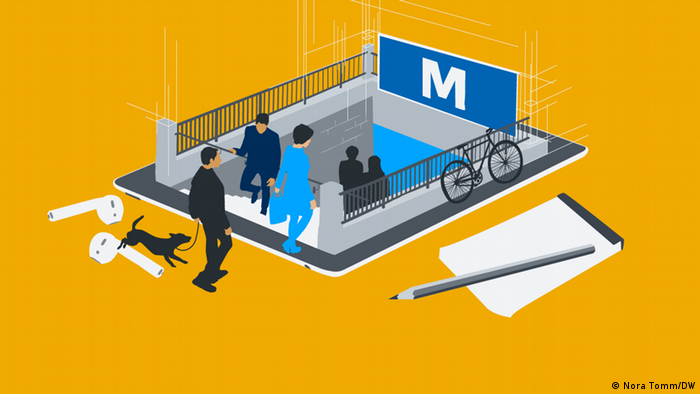
Are we on the cusp of yet another internet revolution? We are, according to technology experts gathered in Berlin for a conference organized by digital learning platform ada.
New technology could overhaul the web as we know it in the coming decade, they said — both when it comes to how it is built and how it looks.
On a technical level, tech idealists hope that blockchain technology will help build a new decentralized architecture underlying the internet. In this new "web3" era, the idea goes, users rather than a handful of tech giants would have control over their data, privacy, and what they create online.
"This reinvents how the internet is set up in the backend," Portugal-based author Shermin Voshmgir said. "It is a complete paradigm shift."
At the same time, companies around the world are working on technology to revolutionize the way we navigate the web.
Their vision: Rather than scrolling through websites or apps, people will soon stroll virtually through a three-dimensional version of the internet dubbed the "metaverse" — a digital landscape of sorts where users can work, buy things or meet their friends, and where physical and digital realities converge.
"It will be a walk-in internet, so to speak," said Constanze Osei, who leads the society and innovation policy efforts for Germany, Austria, and Switzerland at US tech giant Meta, formerly known as Facebook.
But as companies like hers pour billions into developing that next generation of the internet, digital rights activists caution that the firms will eventually want to cash in on their investment — and that this could thwart efforts to give users more power over their digital selves.
"The metaverse could become the most invasive surveillance system ever created," said Micaela Mantegna, an Argentinian lawyer and digital rights researcher.
The evolution of the internet
To understand where the next generation of the internet could go wrong, it helps to look at how we got here.
As early as the 1960s, researchers began connecting computers around the world. But it wasn't until the 1990s that the invention of the world-wide-web and web browsers made the network available to anyone who was able to afford an internet connection.
Since then, the web has upended every aspect of society, from the way people do business to how they find information or interact with each other.
"Everything has changed because of the internet," said Miriam Meckel, CEO of ada and professor of corporate communications at the University of St. Gallen in Switzerland. "And the internet itself has changed, as well."
During the web's first phase, people browsed the web from their desktop computers and navigated it mainly via search engines. That changed in the 2000s with the emergence of social media and mobile internet, giving rise to the online world as we know it today.
At the core of this "web2," there are online platforms such as Meta's Facebook and Instagram or, more recently, messaging services like Telegram.
Those platforms have helped dissidents in authoritarian regimes organize protests or give marginalized groups a voice. But revelations such as the 2018 Cambridge Analytica scandal have shown that they are also used to spread hate, amplify disinformation and sway democratic elections.
Meanwhile, a small number of Big Tech companies like Meta or Google's parent company Alphabet have come to dominate their respective segments of the internet economy.
More power to the users
To shift power back to individuals and communities, people like author Shermin Voshmgir have proposed rebuilding the web with decentralized public blockchains — databases that are searchable by everyone and shared on computers around the world.
Such a "web3" would be collectively controlled by users rather than a few powerful gatekeepers, the idea goes — making it easier, for example, for creatives to make money with the work they publish online.
Now, the multi-billion question is: Will this plan succeed?
Not everyone is convinced: Jürgen Geuter, a Berlin-based internet theorist known online under the pseudonym "tante," doubts that a decentralized architecture alone is enough to shift power back to users. He pointed to cryptocurrencies, a field where already today, a few companies are making millions by developing the software necessary to access the underlying decentralized network.
"Technology is never neutral," Geuter said.
Web3 versus the Metaverse?
To prevent the metaverse from being controlled by just a few influential players, experts say users should be able to interact with each other no matter where in the metaverse they are or how they're using it. That would also be a change from today’s web, where apps are mostly "walled gardens" that do not allow users to send messages or money between different apps, for instance.
"There is an understanding that things need to change from web2," acknowledged Meta's Constanze Osei. She pointed to a new initiative announced in June, with which her company, along with other tech giants and standards-setting bodies, want to discuss interoperability standards. But some big players such as US tech giant Apple are notably absent from the effort.
At the same time, there is a certain irony in the fact that the world's largest tech giants say they want to invest in building a new internet architecture that could, eventually, curb their market power.
And some observers warn that once the companies will try to capitalize on that investment, some of the ideals of a decentralized web3 architecture could end up as collateral damage.
"The corporate version of the metaverse will be an evolution of capitalism," Argentinian lawyer Micaela Mantegna said.
What's more, she added, the immersive nature of the metaverse could exacerbate some of the problems that plague today's web2, from disinformation to online harassment. Some users have already reported being sexually harassed in early versions of the metaverse.
And Mantegna warned that, as technology evolves, the devices used to access the metaverse could at some point begin monitoring sensitive information like the brain activity of users.